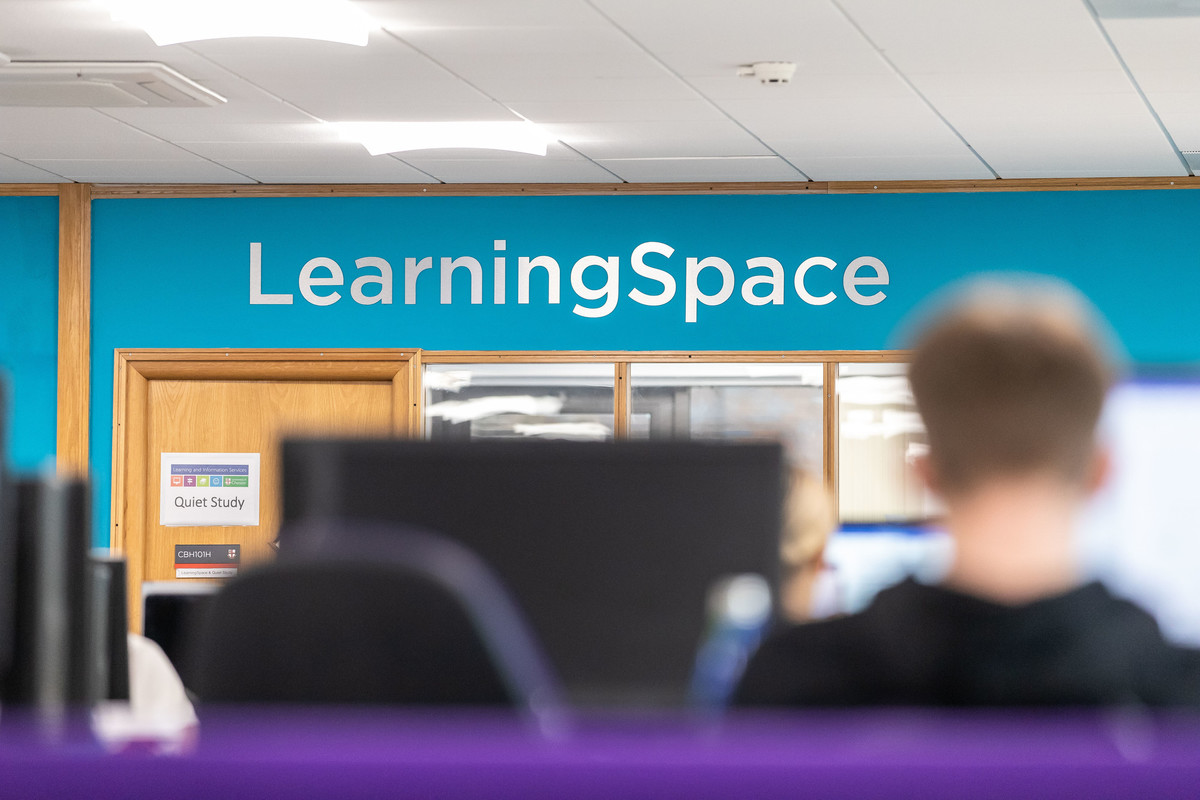Accounting MSc

Available with:
- Placement/Project Year
You are viewing Course summary
Course Summary
Our MSc Accounting course supports the development of your professional career in business, accounting and financial management. This course is aligned to the Association of Chartered Certified Accountants (ACCA) professional examinations.
You will be welcomed by highly experienced academics and will have the opportunity to create a network of like-minded peers. Successful completion of the course will enhance your understanding of financial management and reporting, performance management, risk and corporate governance.
Students will develop an understanding of a range of research methods and analytical techniques through an introduction to research methods.
The final project module develops your critical and investigative skills to help you meet your professional interests and career goals. This may take the form of a dissertation, a work-based case study or a new business development proposal.
The location of Chester Business School provides a unique opportunity to add value to this course by providing expert masterclasses from local, top-ranking companies such as Bank of America, M&S Bank, Airbus, Bentley Motors.
There is an option to choose a Project/Placement year for this course, at an additional cost.
Optional 2-year master's to suit your needs
Choosing a Professional Placement MSc is a win-win for your career, giving you the chance to get real experience, apply your cutting-edge skills in the workplace and stand out to future employers.
In the first year you will have help from the University to find a placement, whilst developing your expertise. You will then spend your second year out in industry on placement, getting the chance to work with industry professionals and grow your network of industry contacts. Bringing the latest business school insights to industry, you will get to make a difference to the workplace and make lasting links with your employer.
Students need to find and secure their own placement, supported by the University. A preparation module will also help you to get ready for your placement.
Please note, this programme is available as a one-year master degree programme, or as a Two-Year Master's Programme with a Professional Placement or Project. Please carefully consider your options when applying for our one year or Two-year routes as successful international applicants will not be able to change between programmes after a Confirmation of Acceptance of Studies (CAS) letter has been issued or after arriving in the UK.
What you'llStudy
The MSc comprises two 30-credit modules, three 20-credit modules, and one 60-credit management research project or case study in context or new business development.
If you choose a placement or project year, the Research Dissertation module will be replaced by a placement or project module.
Module content:
This module covers the following topics:
- Strategy and strategic analysis
- Corporate Governance
- Stakeholders and social responsibility
- Board of directors
- Professional ethics
- Managing risk
- E Business and IT
Module aims:
To develop students' awareness and understanding of Leadership, Corporate Governance, Ethical frameworks and Risk management processes in modern organisations.
Module content:
This module covers the following topics:
- Financial reporting framework
- Reporting financial performance
- Group financial statements
- Performance measurement
- Accounting regulation
Module aims:
To develop students' awareness and understanding of financial reporting, analysis and performance measurement.
Module content:
This module covers the following topics:
- Financing decision and Investment appraisal
- Risk Management
- Dividend decision
- Business valuation
- Corporate failure
Module aims:
To enable students to explore and develop a critical understanding of the theoretical techniques, concepts and methods employed in financial management and organisational change.
Module content:
This module covers the following topics:
- Strategic management accounting
- Approaches to budgets
- Performance reporting
- Performance measurement and appraisal
- Non financial performance indicators
Module aims:
To develop students' critical awareness and understanding of financial and non-financial performance management techniques and reporting.
Module content:
- Introduction to Case Study Analysis – mini, macro, and integrated business case study
- A modelled approach to case study analysis for decision making
- The environmental audit and the case study contexts
- Assessing the challenges within the live case study
- Problem Identification & Analysis and Strategic Intent
- Assumption setting and strategic business planning related to case study example
- Objectives, strategies, action plans, by function to time scales
- Application of key quantitative and qualitative techniques
- Monitoring, review & control planning for performance
- How to write a case study report
- Pitfalls of case study analysis
Module aims:
Provide opportunities for students to solve business case studies (including live cases) examples and justify the solutions that have been put forward from an available pool of different solutions and scenarios
Module content:
- Introduction to company start-ups; legal requirements of setting ups
- Strategic planning – mission, vision, and value proposition
- Conducting the market research and gap analysis
- Creativity and innovation
- The business model and evaluation
- Sources of finance, investment appraisal techniques
- Contribution; break even analysis and sales forecasting
- Stakeholder analysis, pitching and business networking
- Sustainability and business ethics
- Structure of a business plan.
Module aims:
To equip students with relevant skills required to identifying clear business opportunities which are justified by market research and financial feasibility to launch a new business start up.
To enhance the student ability to pitch the business idea to potential investors for consideration for direct investment.
To equip the student with relevant skills required to manage a new business efficiently in the context of ethics, sustainability, decarbonisation and the use digitalisation tools.
Module content:
- Developing the research idea (case study, business development proposal and dissertation)
- Theory, literature and hypotheses
- Research ethics in accounting and finance
- Data collection, sources, measurements, cleaning, summary (descriptive statistics)
- Big Data (4Vs - Volume, Velocity, Veracity and Variety)
- Inferential statistics (predictive analytics)
- Quantitative and qualitative research approaches
- Software - Power BI, SPSS, AMOS, Advanced Ms Excel, Stata, NVivo and others
- Specific techniques for case study, business development proposal and dissertation.
Module aims:
The aim of this module is to enable learners to:
- Design and implement an Accounting and Finance research project using methodologies and methods appropriate to research questions and objectives.
- Identify specific research techniques required for case study analysis, business development proposal and dissertations.
- Analyse and report Accounting and Finance research findings meeting academic and practitioner needs.
- Familiarise themselves with the use of contemporary data analysis tools relevant to the field of Accounting and Finance.
Module content:
A programme of individual study and research project in accordance with established research principles involving the completion of the following elements:
- Introduction to Accounting and Finance research
- Critical review of literature for an Accounting and Finance research project
- Evaluation of appropriate data collection methods
- Data analysis techniques for various research strategies
- Resource and risk planning in research
- Undertaking Accounting and Finance research
Module aims:
The aim of this module is to enable learners to:
- Provide students with the skills to develop an existing research proposal into a piece of rigorous Accounting and Finance research with their supervisor (s).
- To provide students with the skills to write up an extended piece of research, demonstrating academic rigour, including consideration of methodological and ethical issues associated with the programme of academic research.
- To enhance students' project planning, presentation, critical reflection and analysis skills.
Beyond the Classroom
There are opportunities to engage in and attend events presented by outside speakers, both academics and practitioners.
There are also occasional ‘cultural’ events in the School and across the University, giving you the opportunity to learn more about and to mix with fellow students.
Entry Requirements
2:2 honours degree
Accounting or Business Finance related degree with a 2:2 or above.
Or the applicant should be Association of Chartered Certified Accountants (ACCA) registered and have completed or be exempt from the ACCA Applied Knowledge and Applied Skills level examinations.
Students from countries outside the UK are expected to have entry qualifications roughly equivalent to UK A Level for undergraduate study and British Bachelor's degree (or equivalent) for postgraduate study. To help you to interpret these equivalents, please click on your country of residence to see the corresponding entry qualifications, along with information about your local representatives, events, information and contacts.
See below for your country specific requirements. Please note, some programmes have special entry requirements and if applicable, these are listed below.
English Language Requirements
For more information on our English Language requirements, please visit International Entry Requirements.
Fees and Funding
£8,775 for the full course (2025/26)
Guides to the fees for students who wish to commence postgraduate courses in the academic year 2025/26 are available to view on our Postgraduate Taught Programmes Fees page.
The professional placement/project year will cost an additional £2,750, due at the start of the second year of the course.
£15,000 for the full course (2025/26)
The tuition fees for international students studying Postgraduate programmes in 2025/6 are £15,000
Please note: For MSc programmes where a placement or project year is undertaken there will be an additional charge of £2,750 for the placement/project year (due at the start of the second year of the course).
The University of Chester offers generous international and merit-based scholarships for postgraduate study, providing a significant reduction to the published headline tuition fee. You will automatically be considered for these scholarships when your application is reviewed, and any award given will be stated on your offer letter.
For more information, go to our International Fees, Scholarship and Finance section.
Irish Nationals living in the UK or ROI are treated as Home students for Tuition Fee Purposes.
Your course will involve additional costs not covered by your tuition fees. This may include books, printing, photocopying, educational stationery and related materials, specialist clothing, travel to placements, optional field trips and software. Compulsory field trips are covered by your tuition fees.
If you are living away from home during your time at university, you will need to cover costs such as accommodation, food, travel and bills.
The University of Chester supports fair access for students who may need additional support through a range of bursaries and scholarships.
Full details, as well as terms and conditions for all bursaries and scholarships can be found on the Fees & Finance section of our website.
Your Future Career
Job Prospects
The programme is purposefully designed for those who are looking to pursue a career in management in the engineering sector. This includes those with a technical background finding themselves in, or seeking, more senior management posts, and for engineering and project managers who would benefit from a broader range of skills.
The evidence from our alumni is our graduates accelerate their career progression on completion of the programme. They are successful in improving their prospects and landing good quality management posts directly after completion of the programme and senior positions after one or two further iterations in the jobs market.
Careers service
The University has an award-winning Careers and Employability service which provides a variety of employability-enhancing experiences; through the curriculum, through employer contact, tailored group sessions, individual information, advice and guidance.
Careers and Employability aims to deliver a service which is inclusive, impartial, welcoming, informed and tailored to your personal goals and aspirations, to enable you to develop as an individual and contribute to the business and community in which you will live and work.
We are here to help you plan your future, make the most of your time at University and to enhance your employability. We provide access to part-time jobs, extra-curricular employability-enhancing workshops and offer practical one-to-one help with career planning, including help with CVs, applications and mock interviews. We also deliver group sessions on career planning within each course and we have a wide range of extensive information covering graduate jobs and postgraduate study.
 ">
">



 ">
">










